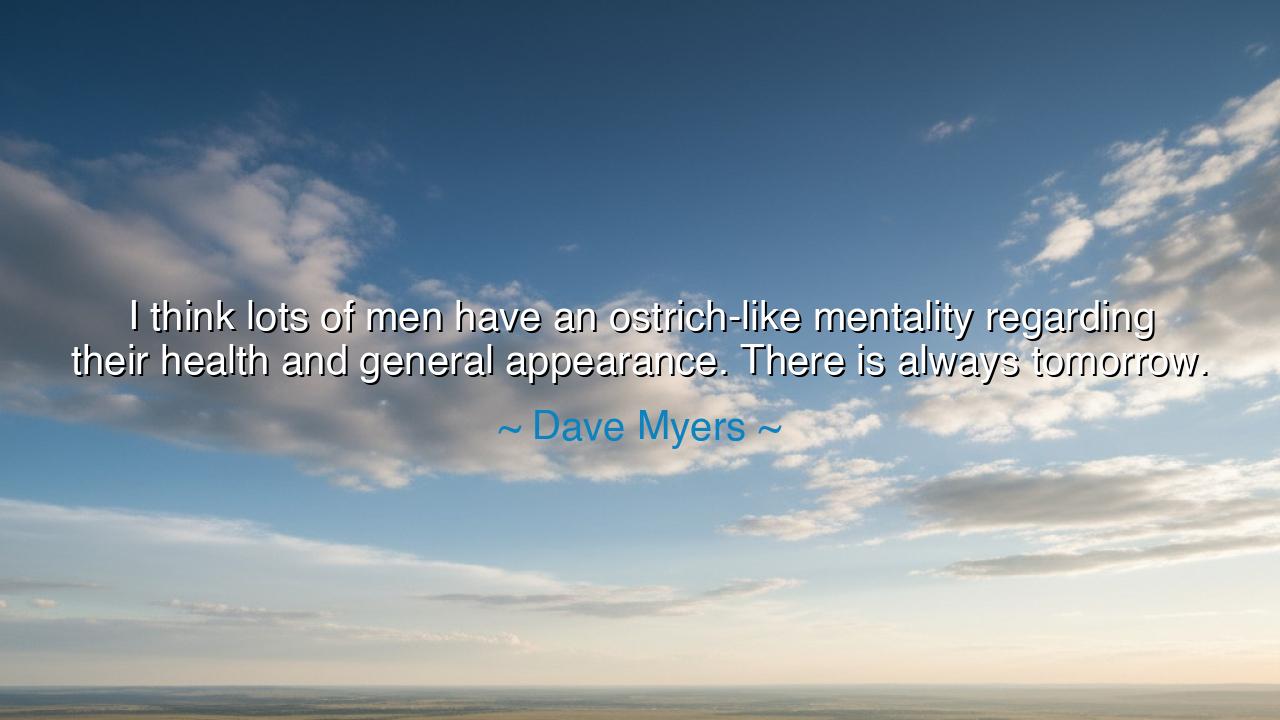
I think lots of men have an ostrich-like mentality regarding
I think lots of men have an ostrich-like mentality regarding their health and general appearance. There is always tomorrow.






“I think lots of men have an ostrich-like mentality regarding their health and general appearance. There is always tomorrow.” — Dave Myers
Hear now the wise and playful voice of Dave Myers, who, beneath his humor, speaks a truth as old as mankind itself. In these words, he reveals the tragedy of procrastination, the quiet self-deception of those who whisper to themselves, “There is always tomorrow.” He likens this blindness to that of the ostrich, who, when danger comes, buries its head in the sand—believing that what it cannot see cannot harm it. But the storm still rages above, and the peril still approaches. So it is with the man who ignores his health, who postpones care and self-reflection until it is too late. Myers calls upon us to lift our heads from the sand, to face the truth of our bodies and our lives before the hour of regret.
In the ancient world, the wise often warned against the delusion of endless tomorrows. The Stoic philosopher Seneca wrote, “While we are postponing, life speeds by.” The Egyptians, too, carved upon their tombs the warning that time is a devourer of men. And yet, century after century, humanity remains ensnared by the same illusion—that health, youth, and vigor are eternal, or at least renewable on command. Myers, though a man of modern times, speaks with the same moral gravity: that to neglect one’s body and soul is to squander the divine gift of being alive.
Consider the story of King Louis XIV of France, the Sun King, whose court shone with grandeur and indulgence. He surrounded himself with beauty, luxury, and feasts beyond measure. Yet, beneath the golden robes, his body suffered from disease and decay. Physicians warned him to rest, to eat less, to care for his health—but he, too, said, “Tomorrow.” And so, as his splendor grew outwardly, inwardly he weakened, until neither crown nor kingdom could save him. His tale, like Myers’s warning, teaches that even kings are mortal, and that denial of health is denial of life itself.
But Myers speaks not only of physical health, but also of appearance and self-respect—for how we tend to ourselves reflects how we honor existence. To neglect one’s appearance is not vanity forsaken, but self-regard forgotten. The body is the vessel through which the soul experiences the world; to ignore its care is to disrespect the spirit within. The “ostrich-like mentality” that he describes is not laziness alone—it is fear. Fear of facing time, fear of acknowledging weakness, fear of accepting that the body requires attention, humility, and discipline.
And yet, there is redemption in awareness. The same man who buries his head can lift it again; the same one who delays can begin anew. For the miracle of health is that it responds to care at any stage. The heart grows stronger with movement, the mind clears with sleep, the spirit brightens with honest effort. There is still tomorrow, yes—but only if one acts today. Myers’s words are not condemnation but invitation: to rise from denial, to meet the self with courage, and to begin the sacred labor of preservation.
In truth, every generation must learn this wisdom anew. The world tempts us to hurry, to labor endlessly, to feed the machine but not the soul. We tell ourselves we will rest later, exercise later, love later, live later—until “later” becomes “never.” The ostrich-like mentality is thus not merely about health, but about the whole human condition: our habit of turning away from truth because it is inconvenient or uncomfortable. Yet it is only by facing discomfort that we become whole.
So, my children of the present age, take heed. Do not wait for sickness to value strength, nor for sorrow to seek joy. Tend to your body, for it is your first home; tend to your spirit, for it is your last. Rise early, eat wisely, move with purpose. Look upon your reflection not with vanity, but with reverence. For the greatest act of gratitude to life is care—care for oneself, care for one’s days, care for the gift of breath. Banish the whisper of “tomorrow,” and act today. For as Myers reminds us, the sands of time bury quickly those who bury their heads.
Lift your gaze, and live.






AAdministratorAdministrator
Welcome, honored guests. Please leave a comment, we will respond soon